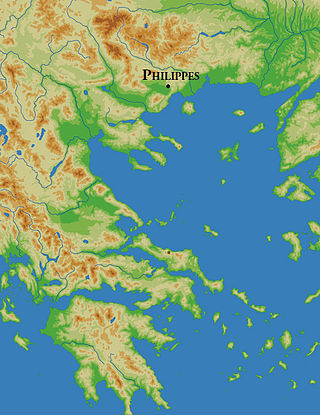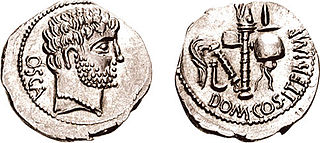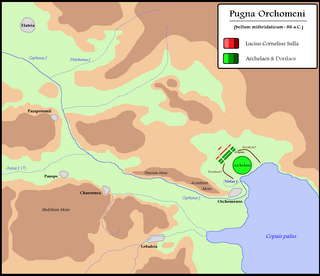
The Battle of Pharsalus was the decisive battle of Caesar's Civil War fought on 9 August 48 BC near Pharsalus in Central Greece. Julius Caesar and his allies formed up opposite the army of the Roman Republic under the command of Pompey. Pompey had the backing of a majority of Roman senators and his army significantly outnumbered the veteran Caesarian legions.

The Battle of Philippi was the final battle in the Liberators' civil war between the forces of Mark Antony and Octavian and the leaders of Julius Caesar's assassination, Brutus and Cassius, in 42 BC, at Philippi in Macedonia. The Second Triumvirate declared the civil war ostensibly to avenge Julius Caesar's assassination in 44 BC, but the underlying cause was a long-brewing conflict between the Optimates and the Populares.

Legio XXII Deiotariana was a legion of the Imperial Roman army, founded ca. 48 BC and disbanded or destroyed during the Bar Kokhba revolt of 132–136. Its cognomen comes from Deiotarus, a Celtic king of Galatia. Its emblem is unknown.

Pharnaces II of Pontus was the king of the Bosporan Kingdom and Kingdom of Pontus until his death. He was a monarch of Persian and Greek ancestry. He was the youngest child born to King Mithridates VI of Pontus from his first wife, his sister Queen Laodice. He was born and raised in the Kingdom of Pontus and was the namesake of his late double great grandfather Pharnaces I of Pontus. After his father was defeated by the Romans in the Third Mithridatic War and died in 63 BC, the Romans annexed the western part of Pontus, merged it with the former Kingdom of Bithynia and formed the Roman province of Bithynia and Pontus. The eastern part of Pontus remained under the rule of Pharnaces as a client kingdom until his death.

The Bosporan Kingdom, also known as the Kingdom of the Cimmerian Bosporus, was an ancient Greco-Scythian state located in eastern Crimea and the Taman Peninsula on the shores of the Cimmerian Bosporus, centered in the present-day Strait of Kerch. It was the first truly 'Hellenistic' state, in the sense that a mixed population adopted the Greek language and civilization, under aristocratic consolidated leadership. Under the Spartocid dynasty, the aristocracy of the kingdom adopted a double nature of presenting themselves as archons to Greek subjects and as kings to barbarians, which some historians consider unique in ancient history. The Bosporan Kingdom became the longest surviving Roman client kingdom. The 1st and 2nd centuries AD saw a period of a new golden age of the Bosporan state. It was briefly incorporated as part of the Roman province of Moesia Inferior from AD 63 to 68 under Emperor Nero, before being restored as a Roman client kingdom. At the end of the 2nd century AD, King Sauromates II inflicted a critical defeat on the Scythians and included all the territories of the Crimean Peninsula in the structure of his state.
The Battle of Chaeronea was fought by the Roman forces of Lucius Cornelius Sulla and Mithridates' general, Archelaus, near Chaeronea, in Boeotia, in 86 BC during the First Mithridatic War. The battle ended with a complete rout of the Pontic army and a decisive victory for the Romans.
Deiotarus of Galatia was a Chief Tetrarch of the Tolistobogii in western Galatia, Asia Minor, and a King of Galatia ("Gallo-Graecia"). He was considered one of the most adept of Celtic kings, ruling the three tribes of Celtic Galatia from his fortress in Blucium.

Gnaeus Domitius Calvinus was a Roman general, senator and consul who was a loyal partisan of Caesar and Octavianus.

The Battle of Orchomenus was fought in 85 BC between Rome and the forces of Mithridates VI of Pontus. The Roman army was led by Lucius Cornelius Sulla, while Mithridates' army was led by Archelaus. The Roman force was victorious, and Archelaus later defected to Rome. The battle ended the Mithridatic invasion of Europe. Information on the battle is included in Plutarch's Life of Sulla, chapters 20–21.
The Battle of the Lycus was fought in 66 BC between an army of Roman Republic under the command of Pompey the great and the forces of Mithridates VI of Pontus. The Romans won the battle with few losses; their victory turned out to be decisive with Mithridates fleeing to the Kingdom of the Bosporus and committing suicide a few years later, finally ending the Third Mithridatic War.

The Liberators' civil war was started by the Second Triumvirate to avenge Julius Caesar's assassination. The war was fought by the forces of Mark Antony and Octavian against the forces of Caesar's assassins, led by Marcus Junius Brutus and Gaius Cassius Longinus, referred to as the Liberatores. The latter were defeated by the Triumvirs at the Battle of Philippi in October 42 BC, and committed suicide. Brutus committed suicide after the second part of the battle.

Pontus was a Hellenistic kingdom centered in the historical region of Pontus in modern-day Turkey, and ruled by the Mithridatic dynasty of Persian origin, which may have been directly related to Darius the Great of the Achaemenid dynasty. The kingdom was proclaimed by Mithridates I in 281 BC and lasted until its conquest by the Roman Republic in 63 BC. The Kingdom of Pontus reached its largest extent under Mithridates VI the Great, who conquered Colchis, Cappadocia, Bithynia, the Greek colonies of the Tauric Chersonesos, and for a brief time the Roman province of Asia. After a long struggle with Rome in the Mithridatic Wars, Pontus was defeated.
Mithridates II of the Bosporus, also known as Mithridates of Pergamon, was a nobleman from Anatolia. Mithridates was one of the sons born to King Mithridates VI from his mistress, the Galatian Princess Adobogiona the Elder. He also had a full-blooded sister called Adobogiona the Younger. The Pontic prince was of Persian, Macedonian and Galatian ancestry.

Asander, named Philocaesar Philoromaios was a Roman client king of the Bosporan Kingdom. He was of Greek and possibly of Persian ancestry. Not much is known of his family and early life. He started his career as a general under Pharnaces II, the king of the Bosporus. According to some scholars, Asander took as his first wife a woman called Glykareia, known from one surviving Greek inscription, "Glykareia, wife of Asander".
The Battle of Nicopolis was fought in December 48 BC between the army of Pharnaces II of Pontus, the son of Mithdridates VI Eupator, and a Roman army led by Gnaeus Domitius Calvinus.

Cappadocia was a province of the Roman Empire in Anatolia, with its capital at Caesarea. It was established in 17 AD by the Emperor Tiberius, following the death of Cappadocia's last king, Archelaus.

Bithynia and Pontus was the name of a province of the Roman Empire on the Black Sea coast of Anatolia. It was formed during the late Roman Republic by the amalgamation of the former kingdoms of Bithynia and Pontus. The amalgamation was part of a wider conquest of Anatolia and its reduction to Roman provinces.

The Mithridatic dynasty, also known as the Pontic dynasty, was a hereditary dynasty of Persian origin, founded by Mithridates I Ktistes in 281 BC. The origins of the dynasty were located in the highest circles of the ruling Persian nobility in Cius. Mithridates III of Cius fled to Paphlagonia after the murder of his father and his predecessor Mithridates II of Cius, eventually proclaiming the Kingdom of Pontus, and adopting the epithet of "Ktistes". The dynasty reached its greatest extent under the rule of Mithridates VI, who is considered the greatest ruler of the Kingdom of Pontus.
The siege of Corduba was an engagement near the end of Caesar's Civil War, in which Julius Caesar had besieged the city of Corduba after Sextus Pompey, Son of Pompey Magnus had fled the city leaving Annio Scapula in charge. Caesar stormed the city and 22,000 people died.

The Pontic War of 48–47 BC was an armed conflict between Rome and the king of Bosporus and Pontus, Pharnaces II, who tried to restore the kingdom of Mithridates VI.














